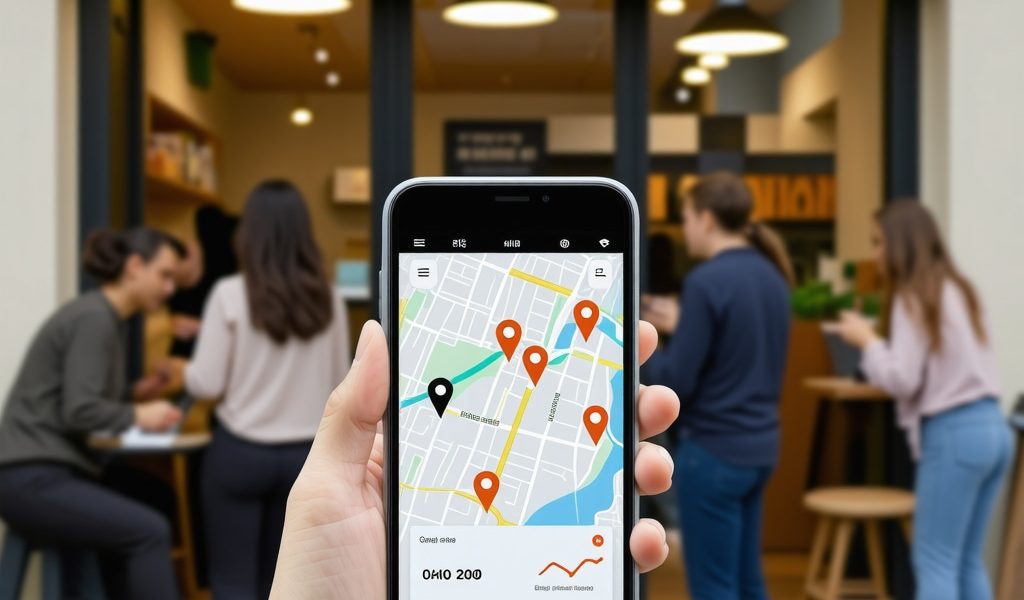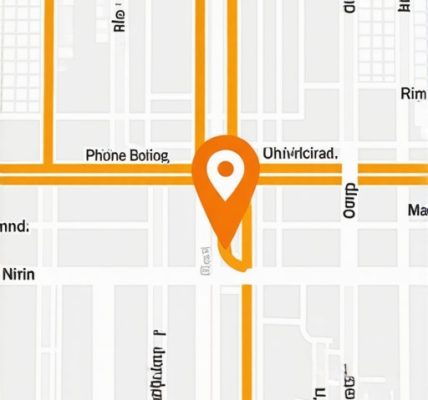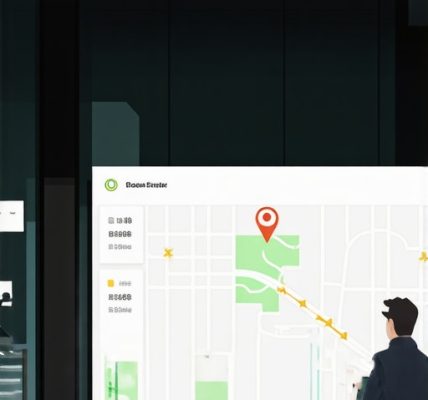Unlocking the Power of Google Maps SEO for Small Business Growth
In today’s hyper-localized digital marketplace, small businesses can no longer afford to overlook the immense potential of Google Maps SEO. This specialized form of local search optimization leverages Google’s mapping platform to drive targeted foot traffic, increase brand visibility, and generate customer engagement right where it matters most: in the local community. However, standing out on Google Maps requires more than just listing your business; it demands a strategic approach that integrates precise data management, authoritative signals, and authentic customer interactions.
Crafting a Magnetic Google Business Profile That Captivates Locals
At the heart of Google Maps SEO is your Google Business Profile (formerly Google My Business). A meticulously optimized profile acts as your storefront in the digital realm. Beyond basic information like address and hours, embedding rich, keyword-informed descriptions, selecting relevant business categories, and regularly updating photos can dramatically enhance your local ranking. For example, a boutique coffee shop that highlights “organic single-origin coffee” and “cozy ambiance” in its profile description is more likely to attract discerning local customers searching with those terms.
How Do Customer Reviews Influence Google Maps Rankings for Small Businesses?
Customer reviews serve as social proof and a ranking factor in Google Maps SEO. Positive, detailed reviews not only build trust but also improve search visibility. Engaging with reviewers by responding promptly demonstrates authenticity and care, which Google’s algorithms favor. For instance, restaurants that actively manage their reviews often see increased placement in the coveted local 3-pack. Encouraging customers to leave reviews with specific mentions of products or services can create keyword-rich testimonials that enhance relevance and authority.
Harnessing Local Citations and Consistency for SEO Authority
Local citations — mentions of your business name, address, and phone number (NAP) across reputable directories — reinforce your legitimacy. Consistency in NAP details across platforms like Yelp, Yellow Pages, and industry-specific directories signals to Google that your business is trustworthy and established. Discrepancies or outdated information can undermine your authority and hurt rankings. Employing expert citation management services can streamline this process, ensuring accuracy and boosting local SEO impact.
Strategic Keyword Integration: The Invisible Magnet for Local Traffic
Keywords tailored to local intent—such as “best plumbing service in [city]” or “affordable yoga classes near me”—are vital. However, stuffing keywords is counterproductive; instead, weaving them naturally into your business description, posts, and answers to frequently asked questions optimizes your profile’s discoverability. Utilizing tools for comprehensive keyword research focused on Google Business Profiles can uncover niche phrases your competitors might miss, giving you a competitive edge.
Captivating Visuals: More Than Just Eye Candy
Google Maps SEO isn’t just text-based. Photo optimization plays a pivotal role in attracting clicks and visits. High-quality images of your storefront, products, team, and happy customers create a compelling narrative. Geotagging photos and naming image files with local keywords can subtly improve your profile’s relevance. Businesses that regularly update their galleries tend to engage users longer, signaling to Google that the profile is active and trustworthy.
For a deep dive into optimizing your Google Business Profile effectively, explore our expert guide here.
Ready to amplify your local presence and draw more customers through Google Maps? Share your experiences with Google Maps SEO or ask questions below — your insights help build a smarter local business community!
Authoritative source: According to Moz’s comprehensive studies on local SEO, consistent and accurate business information combined with active review management are among the top factors influencing Google Maps rankings (Moz Local SEO Guide).
Building Trust Through Authentic Engagement: My Experience with Customer Interaction
Reflecting on my journey optimizing Google Maps SEO, one thing stands out profoundly: the power of authentic customer engagement. When I started responding actively to reviews—thanking customers for positive feedback and addressing concerns with empathy—I noticed a tangible boost in local visibility. Google seems to reward this human touch, enhancing not just rankings but also customer loyalty. It’s fascinating how a simple reply can transform a one-time visitor into a brand advocate, which in turn fuels organic growth.
What Are the Best Ways to Keep Your Google Business Profile Fresh and Relevant?
This question often pops up when I chat with fellow small business owners. Maintaining an updated profile is more than just changing hours during holidays. I found that posting regular updates about events, promotions, or even behind-the-scenes glimpses keeps the profile dynamic and engaging. These posts also create fresh content signals that Google appreciates, which can improve your local search positioning. For instance, sharing a new product launch or a community event not only informs but also invites interaction, creating a loop of engagement and relevance.
Leveraging Local Partnerships and Backlinks: A Game-Changer for Authority
Beyond citations and reviews, I discovered that cultivating local partnerships can significantly enhance your Google Maps SEO. Collaborations with nearby businesses, sponsorships, or participation in community events often lead to valuable backlinks. These links act as endorsements, signaling to Google your business’s authentic presence in the area. According to Moz’s Local SEO Guide, backlinks and citations combined form a strong foundation for local search authority. I personally reached out to a local chamber of commerce and secured a listing on their website, which not only drove traffic but also boosted my profile’s credibility.
Additionally, I recommend checking out comprehensive resources on unlocking Google Maps SEO tips for local visibility to deepen your strategy and stay ahead.
Mastering the Art of Photo and Video Content to Engage Locals
One overlooked aspect in many Google Business Profiles is multimedia content. I started incorporating short videos showcasing my team, product demos, and customer testimonials. Videos, combined with optimized photos, not only grab attention but keep visitors engaged longer. This engagement signals to Google that your business is active and relevant. For example, geotagging videos or embedding local landmarks can subtly reinforce your connection to the community, contributing positively to your rankings.
Have you experimented with photos or videos in your Google Business Profile? What kind of content resonated most with your audience? Feel free to share your stories or questions below—your experiences might inspire others on their Google Maps SEO journey.
For more actionable insights, consider exploring how to optimize your Google Business listing effectively.
Integrating Advanced Structured Data Markup to Elevate Google Maps SEO Precision
While foundational optimization tactics such as maintaining accurate NAP and engaging reviews are critical, elevating your Google Maps SEO requires a robust implementation of structured data markup. Schema.org markup, particularly the LocalBusiness schema, allows search engines to parse and contextualize your business information with greater granularity. This semantic enhancement not only boosts your visibility in local search results but also powers rich snippets, such as star ratings, operating hours, and event details directly in Google Maps and search results.
Implementing structured data demands meticulous attention to detail. For example, including geo coordinates, accepted payment methods, and service areas within the markup can differentiate your profile from competitors who rely solely on unstructured content. Utilizing JSON-LD format is recommended for its compatibility and ease of maintenance. Tools like Google’s Structured Data Testing Tool enable real-time validation to ensure your markup complies with Google’s guidelines and maximizes indexing efficacy.
What Are the Best Practices for Implementing Structured Data Without Triggering Penalties?
Structured data must be truthful and representative of visible content to avoid penalties. Misleading markup—for instance, claiming services or locations not actually offered—can result in ranking demotion or manual actions. The best practice is to keep schema markup synchronized with your Google Business Profile content and website. Additionally, regularly auditing structured data with SEO tools like SEMrush or Screaming Frog can help identify discrepancies or errors that might affect your local SEO performance.
Leveraging AI-Powered Competitive Analysis to Uncover Hidden Local SEO Opportunities
Artificial intelligence has transformed how businesses analyze their local SEO landscape. Leveraging AI-driven platforms can provide nuanced insights into competitors’ Google Maps strategies, such as their backlink profiles, review sentiment, keyword targeting, and citation quality. This granular competitive intelligence enables you to identify gaps and niches your business can exploit to gain an advantage.
For instance, by analyzing competitors’ customer review patterns through sentiment analysis, you can tailor your engagement strategies to address unmet customer needs or capitalize on common compliments, thereby enhancing your profile’s appeal. AI tools also automate citation audits across hundreds of directories, ensuring your business maintains authoritative and consistent mentions, which are paramount for local ranking improvements.
Harnessing the Power of Hyperlocal Content and Community Involvement for Authentic Authority
Building local authority extends beyond your Google Business Profile. Creating hyperlocal content that resonates with your community is a game-changer. Blog posts, event recaps, and case studies that highlight neighborhood partnerships, local causes, or unique stories can drive organic traffic and improve your local relevance signals. Coupled with active sponsorships or participation in community events, these efforts create natural citation opportunities and backlinks that Google values highly.
For example, sponsoring a local charity run and then publishing a detailed recap with photos and participant testimonials can generate buzz and authoritative mentions on local news sites and community blogs. This multifaceted approach blends content marketing, PR, and SEO into a cohesive strategy that deepens your roots in the community and strengthens your Google Maps SEO.
According to the BrightLocal Consumer Review Survey 2023, businesses that actively engage with their community and showcase local involvement see a 35% higher trust rating among consumers, which positively impacts local search performance.
Ready to master these advanced Google Maps SEO strategies and future-proof your local business growth? Dive deeper into structured data implementation, AI tools, and hyperlocal content creation with our comprehensive resources and expert consultations. Engage with our community by sharing your challenges or breakthroughs below—let’s unlock your local potential together!
Decoding the Nuances of Voice Search Integration in Google Maps SEO
With the rise of voice-activated assistants, optimizing for voice search in Google Maps SEO has become an indispensable frontier. Voice queries tend to be more conversational and question-based, demanding a distinct keyword strategy that emphasizes natural language and long-tail phrases. For example, instead of “coffee shop downtown,” users might ask, “Where can I find the best organic coffee near me?” Aligning your Google Business Profile content—including FAQs and posts—with this vernacular can significantly enhance your visibility for voice-driven local searches.
Harnessing Behavioral Metrics to Refine Local Search Performance
Google’s algorithms increasingly evaluate user engagement signals such as click-through rates, direction requests, and call actions originating from your Google Business Profile. By leveraging analytics tools to monitor these behavioral metrics, you gain a window into how effectively your profile converts visibility into tangible customer actions. Iteratively optimizing your profile based on these insights—such as adjusting your business description to highlight high-demand services or refining photo galleries to showcase popular products—can amplify your local search performance exponentially.
How Can Businesses Leverage AI Tools to Automate Review Sentiment Analysis and Response?
AI-powered platforms now offer sophisticated sentiment analysis on customer reviews, categorizing feedback by themes like product quality, service speed, or ambiance. This automation enables businesses to promptly identify critical issues or capitalize on strengths without manual review sifting. Some advanced tools also facilitate automated, personalized responses that maintain authenticity while ensuring rapid engagement. Integrating these AI solutions into your Google Maps SEO strategy not only elevates responsiveness but also fosters improved customer satisfaction and higher rankings.
Elevating Local SEO with Geo-Targeted Paid Campaigns Complementing Organic Efforts
While organic optimization is paramount, combining it with hyperlocal paid campaigns on Google Ads can supercharge your foothold in competitive markets. Strategically geo-targeting ads to neighborhoods or radius zones around your business ensures your paid presence aligns with your Google Maps SEO footprint. This synergy enhances brand recall, drives immediate foot traffic, and complements your organic rankings by increasing overall search prominence.
Expert Insights: Leveraging Schema.org Extensions for Dynamic Local Business Features
Beyond the standard LocalBusiness schema, incorporating advanced Schema.org extensions such as Service, Event, and Offer can dynamically enrich your profile. For instance, marking up special promotions or upcoming events with structured data enables Google to display these details prominently in search results and Maps, attracting timely customer interest. The Google Developers Structured Data Guidelines for Local Business provide authoritative, in-depth recommendations for implementing these enhancements effectively.
Ready to transform your local SEO strategy with these cutting-edge tactics? Engage with our expert community or request a tailored consultation to unlock your business’s full potential on Google Maps today!
Frequently Asked Questions (FAQ)
What is the primary difference between Google Maps SEO and traditional SEO?
Google Maps SEO specifically targets local search results within Google Maps and local packs, focusing on optimizing your Google Business Profile, local citations, and geographic relevance. Traditional SEO encompasses broader organic search optimization across all search engine results pages (SERPs). Google Maps SEO requires a hyperlocal approach emphasizing location accuracy, reviews, and localized content to capture nearby customers effectively.
How important are customer reviews in influencing Google Maps rankings?
Customer reviews are critical as they serve both as social proof and a ranking factor. Positive, detailed reviews improve your profile’s relevance and trustworthiness, boosting rankings and click-through rates. Engaging with reviews by responding promptly further enhances your credibility in Google’s eyes, increasing the likelihood of appearing in the local 3-pack and attracting more customers.
Can implementing structured data markup on my website improve my Google Maps SEO?
Yes, incorporating structured data markup such as Schema.org’s LocalBusiness schema helps search engines better understand and display your business information. Properly implemented structured data can generate rich snippets, enhancing your visibility in local search results and Google Maps. However, it must accurately reflect your real business details to avoid penalties.
How can AI tools enhance my local SEO strategy?
AI-powered platforms enable advanced competitive analysis by examining competitors’ backlink profiles, review sentiment, keyword targeting, and citation consistency. They facilitate automated sentiment analysis and personalized review responses, helping you maintain a responsive and authoritative online presence. AI also assists in auditing citations and structured data, ensuring accuracy and maximizing your local SEO impact.
What role does hyperlocal content play in Google Maps SEO?
Hyperlocal content, such as neighborhood-specific blog posts, event recaps, and community involvement stories, strengthens your local relevance signals. It attracts organic traffic from your immediate area and generates authoritative backlinks and citations. This authentic engagement fosters trust with both the community and search engines, elevating your Google Maps ranking.
How should I optimize my Google Business Profile photos and videos?
Use high-quality, geotagged images and videos that showcase your storefront, products, team, and happy customers. Naming image files with local keywords and regularly updating your media gallery signals activity and authenticity. Video content, including testimonials and behind-the-scenes looks, engages visitors longer, positively influencing your profile’s local search performance.
Is voice search optimization necessary for local businesses?
Absolutely. Voice searches tend to be conversational and question-based, so tailoring your Google Business Profile and FAQ content with natural language and long-tail keywords improves your chances of appearing in voice-driven local queries. This adaptation helps capture a growing segment of users relying on voice assistants to find nearby businesses.
How can I maintain NAP consistency across multiple platforms?
Ensure your business name, address, and phone number are identical across all directories, social profiles, and citation sites. Employ citation management tools or services to monitor and update listings regularly. Consistent NAP boosts Google’s trust in your business’s legitimacy and directly impacts your local search rankings.
What are the advantages of combining paid geo-targeted campaigns with organic Google Maps SEO?
Geo-targeted paid campaigns complement organic SEO by increasing immediate visibility and brand awareness within specific local zones. This synergy drives foot traffic and enhances overall search prominence, reinforcing your organic rankings and delivering measurable ROI in competitive markets.
How do local partnerships and backlinks influence Google Maps SEO?
Partnerships with local organizations and businesses often lead to high-quality backlinks and authoritative citations. These endorsements signal to Google your authentic presence in the community, enhancing your profile’s authority and improving local search rankings. Active community involvement also generates natural content and citation opportunities.
Trusted External Sources
- Moz Local SEO Guide – Offers in-depth research and actionable strategies on local SEO best practices, including citations, reviews, and Google Business Profile optimization.
- Google Developers Structured Data Guidelines for Local Business – Provides authoritative instructions for implementing Schema.org markup to improve local search visibility and rich snippet features.
- BrightLocal Consumer Review Survey 2023 – Presents valuable data on consumer trust factors and the impact of community engagement on local search performance.
- Google Search Central Blog – Shares updates and expert advice on Google’s algorithms, structured data, and local SEO advancements.
- Semrush Local SEO Toolkit – Industry-leading toolset for auditing citations, competitor analysis, and structured data validation to refine local SEO campaigns.
Conclusion
Mastering Google Maps SEO is indispensable for small businesses aiming to dominate their local market in today’s digital landscape. By meticulously optimizing your Google Business Profile, maintaining citation consistency, leveraging authentic customer engagement, and embracing advanced tactics such as structured data markup and AI-powered insights, you can unlock substantial local visibility and customer acquisition. Integrating multimedia content, hyperlocal storytelling, and voice search optimization further fortifies your presence, making your business stand out in the competitive local ecosystem. Moreover, complementing organic efforts with geo-targeted paid campaigns and cultivating local partnerships can accelerate growth, creating a robust, multi-dimensional local SEO strategy. We encourage you to apply these comprehensive techniques, share your successes or challenges, and explore related expert resources to continually elevate your Google Maps SEO prowess. Together, let’s transform local search into your business’s most powerful growth engine!


